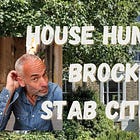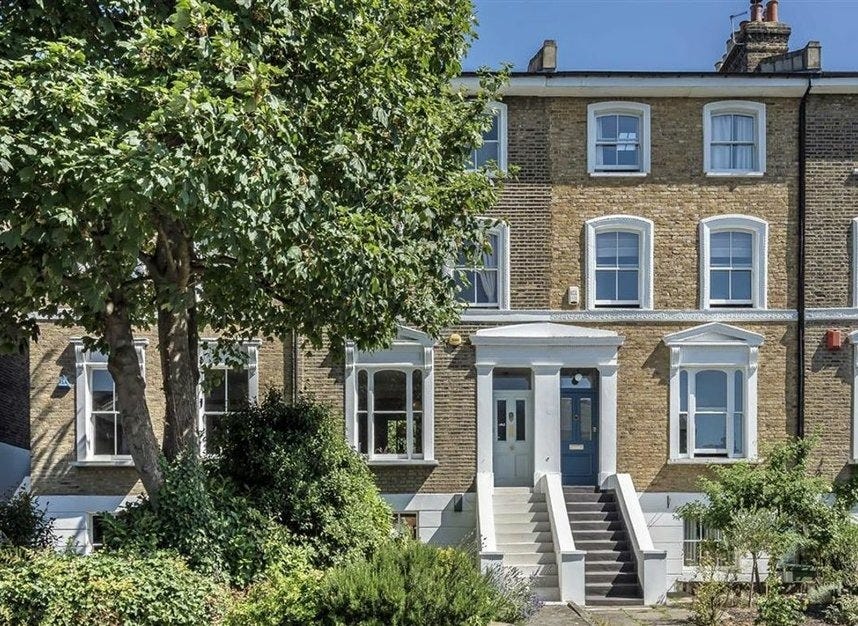There is also now a video version of this article, if you prefer, here:
I’ve been viewing houses this past fortnight, so I thought I’d share my anecdotal 2p on the state of the London property market.
I’m looking in Brockley, SE4, which, if you don’t know it, used to be rough AF, but is now where all the cool kids are. The area has benefited from the various London rail line extensions – you can be in Shoreditch or Canary Wharf in 15 minutes; the Jubilee and Elizabeth lines are a similarly short step away – and that has attracted the slay crew to the area.
The road links though are still horrendous though, made worse by 20mph speed limits and bus lane misallocation of essential road space. The drive to west London is interminable.
Brockley has a good stock of beautiful detached, semi-detached and terraced Victorian houses. For example:
With its proximity to Greenwich and the river docks, it was once a wealthy area, though, like most of south-east London, it got bombed to heck in the war.
There are plenty of nice parks too. One of them, Hilly Fields, was modelled on Hampstead Heath, and there are many gorgeous houses in the roads running off it. Not quite Hampstead gorgeous, but getting there.
Brockley also has the highest density of cemeteries in London, if you fancy dying any time soon, it’s highly convenient. It is, I gather, London’s most haunted area.
It is only a bit stabby. Nothing like as bad as neighbouring Lewisham. (Maybe “only a bit stabby” will one day become part of estate agents’ jargon, perhaps to replace “vibrant”. I can’t believe how normalised stabbing now is that I’m talking like that.)
The stabbiness is offset, however, by the plethora of nice restaurants, cafés, bars, craft ale breweries, the farmers’ market, mini-festivals, pilates studios et al. I understand, in Browns, the area boasts London’s best coffee and, in Babur, its best Indian restaurant. (Technically Babur is in Honor Oak, but, like England and many of its foreign sporting greats, we’ll claim it as our own.)
I shot this vid from the steps up to the station.
Brockley feels younger and more up-and-coming than the once-cool areas to the west like Queen’s Park, Kensal Rise, Clapham and so on, probably because of its easy access to east London. (A lot of people from Hackney move down here.)
I moved here begrudgingly and skint in 2015 and have grown to really like it.
But what about the housing market?
I’ve known markets in which estate agents don’t give you the time of day, there are so many prospective buyers, but – perhaps because they know I am an unencumbered buyer – the agents are maybe not quite all over me, but certainly on my case: lots of emails, phone calls and the rest of it. That indicates it’s more of a buyers’ market.
But, while I would describe the housing market here as slow, it is not dead. Stuff has been going under offer in the two weeks I’ve been looking, though rarely at asking.
With the costs of moving – Stamp Duty is 10% above £925k, and 12% above £1.5m, plus an extra 5% if you own another property – buyers have got to really want to buy.
Sellers, meanwhile, have to really want to sell, which often entails reducing their asking prices. Stuff which is unrealistically priced is staying on the market a long time. Look at this one (actually up the road in Honor Oak):
This is a 5,000-square-foot property, not so nice inside, but with access to a 2-acre private garden behind with its own tennis court – quite something in London. From £2.5 million to £1.75 million and they still can’t shift it. (It needs a lot of money spending on it.)
On the other hand, there don’t seem to be many forced sellers – people who can’t make their payments – and we won’t get any house price crash, long-awaited or not, until that is a reality.
I imagine Brockley, as a young, trendy area, is busier than other parts of town, but that is my overall feel: slow, but not dead.
I’ve looked at a few family houses. I can’t really comment on flats, but I gather there is an oversupply of 2-bed flats across London, and it is really hard to shift them. I’m not sure if this applies to Brockley or not.
It doesn’t feel as expensive as it did around 2019–2022 (realised sales prices are a fraction lower, but there is obviously currency debasement to consider too), but nor does it feel super cheap. We’re a long way off where we were in, say, 2013, even though grander parts of London – Kensington and Chelsea, for example – are back at those 2013 levels.
Where does the housing market go from here?
It all depends on two things: interest rates and Stamp Duty.
Britain’s zombie housing market, brought to you by Stamp Duty.
If rates go lower, the market will not collapse. There won’t be the forced sellers. We’ll continue as we are: stagnant. If rates go higher, the market is in trouble.
But get rid of Stamp Duty, and you’d have a flurry of activity across the country tomorrow. People aren’t moving because of the amount of dead money involved. Stamp Duty has immobilised the country.
If you’re buying a two-million-pound house, you will pay £153,750 in stamp duty. Cash. Money you’ve already paid tax on once. You can’t borrow the money. You have to be extremely rich, or extremely desperate for a home, to be willing to pay a £150k one-off tax of this kind. Most would rather avoid paying it, so they don’t move.
You will pay more if you are not a UK resident.
If you happen to own another property – which most people in that wealth bracket will, either their first flat they never sold, a property they inherited, or a home in the country – and the house you are buying is not your main residence, the tax rises to £253,750. A quarter of a million quid.
That’s why houses in Kensington and Chelsea no longer sell.
EDIT: My mate, whose kids have now flown the nest, sent me this: "We live in a 4 floor house, 2 floors we don't use, I haven't been to the top floor for about 5 years (seriously). We would love to move and downsize but makes no sense as the costs of buying a new house would use up all the gain on downsizing . IE We just end up with a smaller house."
This happens all the way down the scale. Kirstie Whatsit off the telly was tweeting about it the other day.
My mother’s friend, who is in her 70s, lives in a 2-bed flat two floors up in Wandsworth worth maybe £700,000. She is worried about climbing the stairs at her age, and wants to move to another 2-bed flat. She will pay £25,000 in Stamp Duty on top of all her other moving costs. She doesn’t have 25 grand to throw away.
The result is this nearly dead market. Britain’s zombie housing market.
Stamp Duties were one of the taxes the ignited the American Revolution. If only we had muskets today …
The biggest villains in all this are former Chancellor Gordon Brown for first raising Stamp Duty on property transactions (before him it just one per cent on all properties over £60,000), and, worst of all, George Osborne for raising the rates to today’s ludicrous levels. Rather than address the root causes of unaffordable housing – fiat money, artificially low interest rates, improper measures of inflation and dumb planning laws – he blamed the market, and attacked it with Stamp Duty. But all of Jeremy Hunt, Rishi Sunak, Sajid Javid, Philip Hammond and Alistair Darling must take their share of the blame for failing to do anything about it, when they had the chance. (We’ll give Kwasi Kwarteng and Nadhim Zahawi a pass on the grounds they didn’t have the gig for long enough).
Osborne, Brown et al have given birth to the zombie situation we have now. They have immobilised the country in the process.
Government. Yet again. 0 stars. Would not use again.
It’s enough to make you a libertarian.
Until next time,
Dominic
PS If you enjoyed today’s article, please like, share and all that stuff. It really helps.
PPS If you missed this week’s market commentary, here it is:
As always If you are buying gold to protect yourself in these times or relentless currency debasement, the bullion dealer I use and recommend is the Pure Gold Company. Pricing is competitive, quality of service is high. They deliver to the UK, the US, Canada and Europe or you can store your gold with them.


















